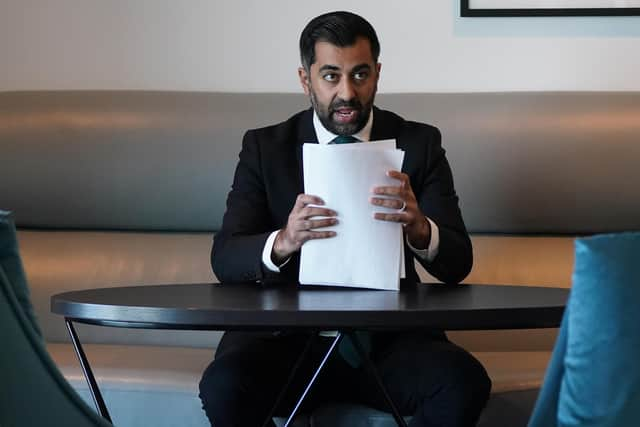Councils say 'no agreement' to freeze council tax as urgent meeting with Humza Yousaf demanded
There is no agreement to freeze council tax in Scotland next year, the umbrella body of Scottish local authorities has said as the escalating row over the First Minister’s speech continues.
Humza Yousaf announced a planned freeze of the tax in his conference speech in Aberdeen yesterday, sparking fury from council leaders who were not consulted and anger from coalition partners the Scottish Greens.
Advertisement
Hide AdAdvertisement
Hide AdCOSLA is set to hold emergency talks with the deputy first minister, Shona Robison, today and has also demanded an urgent meeting with Mr Yousaf to discuss the policy.


They said there was “absolutely no agreement” among local authorities with the planned freeze, highlighting that councils are the only ones with the power to freeze the tax.
A spokesperson said there was “real anger at the way this has been handled and what it puts at risk”.
They added: “We deplore the way the announcement was made and its substance, both of which fly in the face of the Verity House Agreement which we all recently signed.
“It has been shown that previous council tax freezes have been regressive, having no impact for the poorest in society and eroding the council tax base, compounding councils' ongoing underfunding.
“We will explore the implications arising and what the Scottish Government might propose when we meet with the Deputy First Minister later today - but we are clear that local taxation and particularly Council Tax should be left for democratically elected councils to determine.”
The cost of the council tax freeze is still not clear as the planned reforms to council tax bands was likely baked into many local authority projections for next year’s budgets.
In a presentation delivered to third sector organisations earlier this month, the Institute for Fiscal Studies estimated the income from the ditched council tax reforms as £175m a year.
Advertisement
Hide AdAdvertisement
Hide AdCouncils are likely to request at least this amount from the Scottish Government, who said a fully funded freeze equal to cover a potential three per cent rise in council tax would cost around £100m.
The IFS also said “more radical reform” of council tax could raise more money, but plans to do so in the short term are non-existent.
Council tax is a small percentage of how local authorities are financed, with the bulk of the more than £15bn in funding coming from Scottish Government grants, with council tax estimated to provide around £2.6bn.
On top of this, authorities are able to charge for services and issue fines, which government figures state add a further £9bn to their overall income stream.
The IFS state council funding fell 9.5 per cent in real terms between 2009-10 to 2018-19, but has since increased and is now just 3 per cent lower than in 2009-10.
However, this is in part due to increased responsibilities, with funding being 6 per cent lower than in 2009-10 when new childcare funding is stripped out.
This demonstrates the scale of cuts faced by councils, and why services are under significant strain.
Scottish Government insiders say the freeze is part of the First Minister’s bid to tell people that the SNP remains on their side, particularly during the difficult times of a cost-of-living crisis.
Advertisement
Hide AdAdvertisement
Hide AdThere is also an awareness that there is a lack of an opposition plan to tackle such a move, and that the previous freeze was politically difficult for Scottish Labour to argue against.
Many councils in Scotland, including East Lothian, Edinburgh, Fife, and Stirling, are currently controlled by Scottish Labour minority administrations.
The freeze forces those councils to either sign up or to argue for council tax increases, something which would likely be ruthlessly exploited at next year’s general election.
Comments
Want to join the conversation? Please or to comment on this article.
